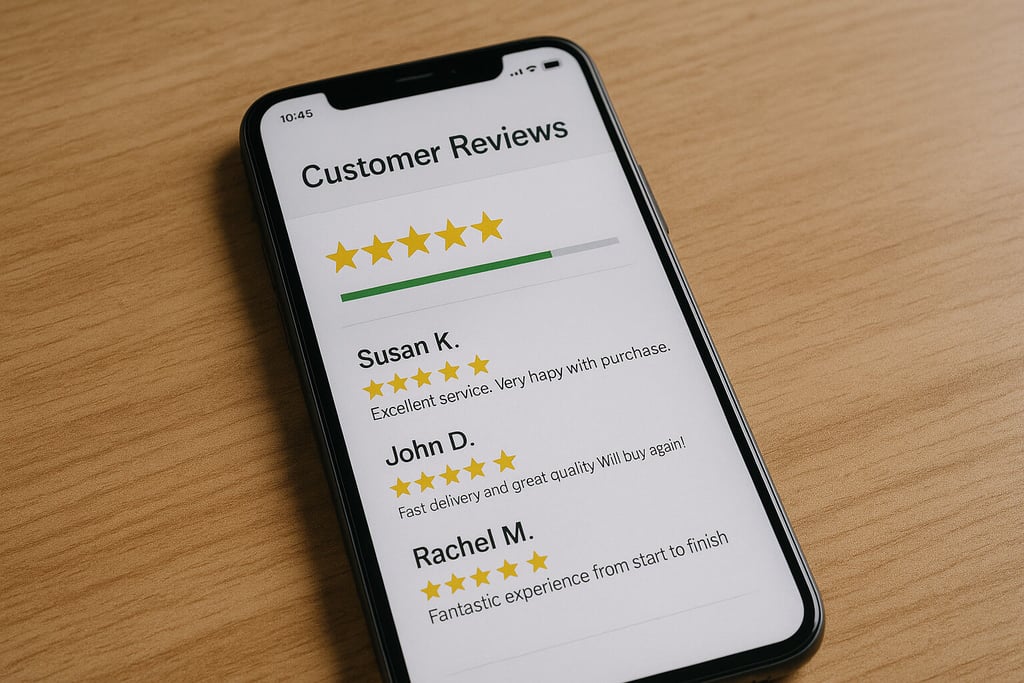SEOJet Flight Blog
Do Customer Reviews Help SEO? Boost Your SEO Efforts
Do customer reviews help SEO? Boost your SEO efforts with customer feedback and user-generated content! Google reviews help SEO ranking and attract potential customers.
SEO STRATEGY
Ardene Stoneman
5/1/20257 min read


How Customer Reviews Improve SEO and Why Responding Matters
Customer reviews influence more than just buying decisions - they have a direct and measurable impact on your SEO.
From boosting your visibility in search engine results to building trust with potential customers, the way you manage and respond to reviews plays a bigger role in your SEO efforts than most businesses realise.
This article breaks down how reviews help SEO, why reviews are important, and what you should be doing to make them work for your business.
Whether you're new to managing customer reviews or want to sharpen your strategy, this guide is packed with insight to help improve your SEO using user-generated content.
Article Outline
Why Customer Reviews Are Important for SEO
Do Reviews Help SEO or Just Look Good?
How Do Google Reviews Help Your SEO Efforts?
What’s the Real Impact of a Negative Review on SEO?
Should You Respond to Reviews - Even the Bad Ones?
How Many Customer Reviews Do You Really Need?
Are Star Ratings in Search Results Worth Chasing?
Where Should You Display Reviews on Your Website?
Can Reviews Help Improve Your Click-Through Rate?
How to Encourage Customers to Leave Reviews Without Nagging
1. Why Customer Reviews Are Important for SEO
Customer reviews are important for SEO because they act as content created by real people, using real-world language about your product or service.
This type of user-generated content sends a strong signal to Google that your site is active, trusted, and relevant.
Reviews often mention keywords and location terms naturally, which can help search engines like Google better understand what you offer and where you operate.
They also provide social proof. When a potential customer sees positive reviews, they're more likely to trust your business.
That trust leads to longer on-site engagement, better click-through rates, and ultimately more conversions - all signals that improve your SEO ranking.
For local SEO in particular, reviews are a key part of what gets you listed in Google Maps and the local 3-pack.
2. Do Reviews Help SEO or Just Look Good?
It’s not just about looking good. Reviews help SEO directly by improving your visibility in search engine rankings.
Search engines look at the frequency, recency, and quality of customer reviews when determining how to rank local businesses.
The more relevant and genuine reviews your business gets, the stronger your position in search results.
Google reviews help reinforce the relevance of your business for certain searches.
If your reviews mention the product or service a person is searching for, or even your local area, they help signal to Google that your site is a match.
That’s why reviews can help with on-page SEO and contribute meaningfully to an overall SEO strategy.
3. How Do Google Reviews Help Your SEO Efforts?
Google reviews play a specific role in SEO, especially for businesses targeting local customers.
Each google review acts as a trust signal to Google that your business is real, active, and valued by the community.
For businesses on Google Maps, reviews directly affect how often you're shown in map results.
They’re also one of the easiest ways to improve your Google Business Profile. Google looks at your star rating, the number of reviews your business has, and how regularly you get new reviews.
It’s a strong signal to Google’s algorithm - and helps signal to Google that your listing deserves to be shown over others.
Google reviews help more than just ranking. They support customer trust, help improve click-through rates from search results, and can make your business look established, even if you're small or just starting out.
4. What’s the Real Impact of a Negative Review on SEO?
A negative review won’t necessarily destroy your SEO, but how you handle it can affect SEO. A single bad review in a sea of positive reviews is normal and expected.
But if you don’t respond to reviews, especially the negative ones, you miss the chance to show your dedication to customer satisfaction.
Responding to negative reviews constructively and professionally demonstrates your commitment to customer care. This improves customer experience and shows search engines that you engage with your audience.
A cluster of unaddressed bad reviews, on the other hand, might lead to a negative impact on your SEO over time - not because of the content itself, but because it suggests poor customer service.
For SEO purposes, negative reviews are only harmful when they go unanswered, are frequent, or reflect ongoing customer service problems.
Reviews aren't filtered for only good ones - search engines want a genuine picture, so negative reviews constructively handled can actually benefit SEO.
5. Should You Respond to Reviews - Even the Bad Ones?
Yes, always. Respond to reviews, especially when customers leave a review that’s negative or critical. This shows both search engines and your audience that you care about customer feedback.
It also gives you a chance to fix issues and demonstrate your dedication to customer service in public.
Responding to reviews gives you another opportunity to use keywords naturally. If a customer mentions a specific product or service, your reply can help reinforce that content for SEO purposes.
Even a short message acknowledging the feedback adds value and helps manage reviews effectively.
Remember, reviews aren’t just about the reviewer - they’re also read by every potential customer who’s thinking about buying from you. Responding shows that you value customer input and take action when needed.
6. How Many Customer Reviews Do You Really Need?
There’s no exact number, but generally speaking, the more, the better - as long as they’re genuine reviews. A steady stream of new reviews helps search engines see your business as active.
It also gives customers confidence that your service or product is still relevant and up to date.
The volume of customer reviews can affect SEO indirectly. A higher number of reviews often translates into more trust and higher click-through rates.
For example, if one business has 10 reviews and another has 150, the second one looks more established and more trustworthy, even if both have similar ratings.
To keep momentum, make it easy for customers to leave reviews. Follow up after a purchase or completed job, and ask for feedback while the experience is still fresh.
Encourage customers to leave reviews without overdoing it, and always thank them when they do.
7. Are Star Ratings in Search Results Worth Chasing?
Definitely. A strong star rating in search results improves your click-through rate, which has an impact on SEO.
When customers see a 4.8-star business vs. one with a 3.6-star average, the difference is clear - and it often leads to more traffic, more engagement, and better rankings.
Star ratings appear in rich snippets when you use the correct schema markup and collect reviews on your website or trusted third-party sites.
This added layer of detail in the search result can draw more attention and improve your SEO indirectly through better engagement metrics.
Google reviews help your star rating stand out, but you can also benefit from collecting product reviews on your own website.
Display reviews clearly and make sure they’re connected to the right product or service page. Reviews and ratings build trust and support both the SEO and sales process.
8. Where Should You Display Reviews on Your Website?
Don’t bury them in a hidden tab. Reviews on your website should be easy to find and visible near the decision points - on product pages, service descriptions, or landing pages.
This visibility helps customers make quicker decisions and supports your on-page SEO at the same time.
Search engines index reviews as part of your site content, especially when they’re loaded server-side and not hidden behind JavaScript.
That means the words your customers use in their reviews can influence your SEO. Reviews can also help cover long-tail keywords you haven’t included in your main content.
Displaying reviews also adds fresh content to your pages. This user-generated content changes naturally over time and keeps your site from looking stale.
If you're collecting and displaying recent reviews regularly, you’re feeding search engines new information every time they crawl your pages.
9. Can Reviews Help Improve Your Click-Through Rate?
Yes - and improving click-through rates improves SEO. When your listings in search results include reviews and a good star rating, people are more likely to click on your result over a competitor’s.
This sends a signal to Google that your listing is relevant and engaging, which can influence rankings over time.
Reviews enhance your search appearance in other ways, too. They support rich snippets, which take up more space on the search engine results page and look more professional.
They also encourage customer engagement and repeat visits.
The link between reviews and click-through rates is simple: good reviews make you stand out.
Whether someone’s searching for a product or a local business, they want reassurance. Reviews provide it - and if you use them well, they’ll boost your SEO efforts naturally.
10. How to Encourage Customers to Leave Reviews Without Nagging
Getting reviews can be awkward if you ask the wrong way. The key is to time it well and keep the process simple.
Ask customers to leave a review shortly after their experience with your product or service - ideally while it’s still fresh in their mind. This increases your chances of a genuine response.
For ecommerce SEO, a post-purchase email with a direct review link works well.
For local businesses, a quick SMS or message through the platform the job was booked on can prompt action.
Let customers know their opinion matters and that their feedback helps other customers.
Reviews are a powerful SEO tool, but they rely on consistent effort. Make it part of your process. Encourage customers to leave reviews and demonstrate your appreciation when they do.
When customers feel valued, they’re more likely to share their experience - and that’s what keeps reviews flowing.
Key Points to Remember
Customer reviews improve your search engine visibility by acting as user-generated content.
Google reviews help with local SEO and influence your ranking in Google Maps and local search.
Reviews help SEO by supporting keyword relevance, trust signals, and content freshness.
Star ratings in search results improve click-through rates and send positive engagement signals.
Responding to reviews, including negative ones, shows your commitment to customer service.
You don’t need hundreds of reviews overnight - just a steady stream of genuine reviews.
Display reviews clearly on key pages to maximise their SEO value.
Reviews and ratings contribute to customer trust and on-page SEO metrics.
Encouraging more reviews improves your overall SEO strategy over time.
Reviews can help with product ranking, service trust, and the impact of reviews on search is proven.
Services
Contact Us
Newsletter Signup
sales@seojet.co.uk
01934 289 404
© 2025. All rights reserved.


Locations
Weston-super-Mare
Somerset
Bristol
9am - 6pm, Monday to Friday
Suite 2, Unit 7, 12 Beaufigter Rd, Weston-super-Mare, BS24 8EE
